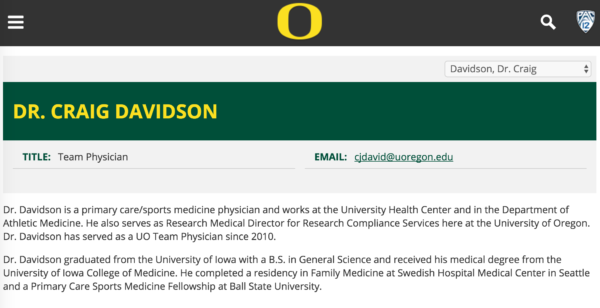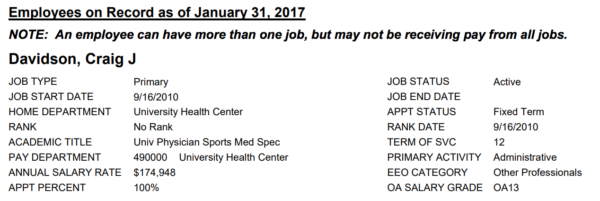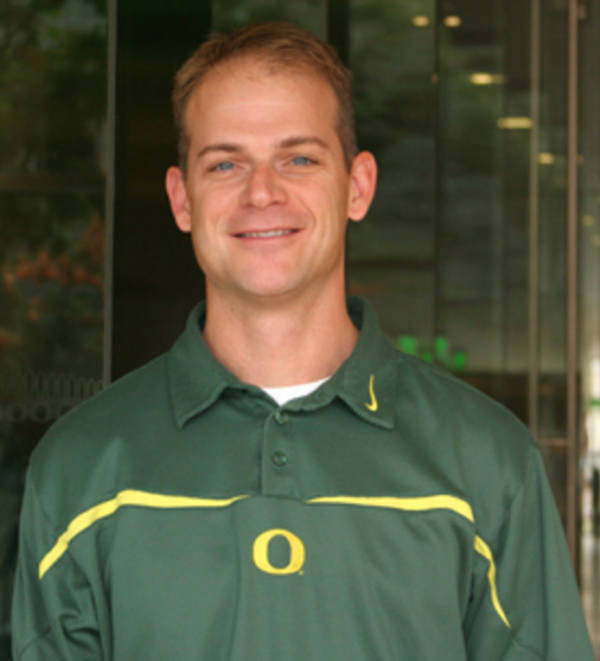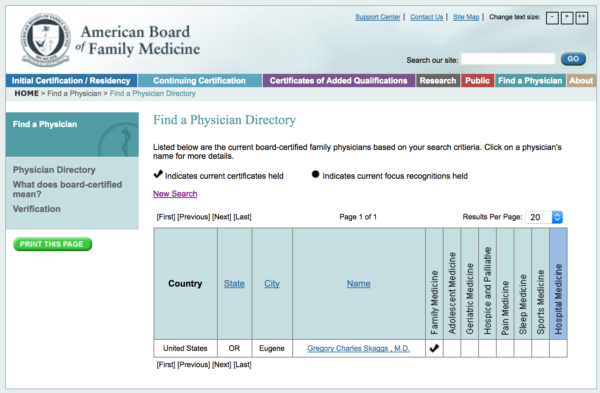Last updated on 09/20/2017
9/20/2017: I don’t know. Here’s his job description, explaining that his duties are split between the Ducks Department of Athletic Medicine, and the University Health Center, followed by his salary report showing all his pay comes from the UHC, which is funded by student health fees:


But at least he’s board certified in Sports Medicine. In fact it was a requirement for the job, although his boss doesn’t have it.
9/7/2017: Duck Director of Athletic Medicine Greg Skaggs is not board certified in Sports Medicine

The American Medical Association / ABMS website notes:
My Doctor is Board Certified. Is Yours? You want quality care for your family. That’s why choosing a Board Certified doctor is so important.
Board Certification is a voluntary process that goes above and beyond licensing requirements – it’s a commitment to continually expand knowledge in a medical specialty.
Presumably that knowledge would include concussion treatments, rhabdo, exercise during low air quality, and perhaps some CTE on medical ethics and conflicts of interest while working as a team doctor. This 2010 UO job announcement for a University Physician notes:
MINIMUM QUALIFICATIONS:
Graduate of accredited medical school
M.D. or D.O. Licensure by the Oregon Medical Board – (or license eligible)
ABMS-approved board certification in Internal Medicine, Family Medicine or Pediatrics
Successful Completion of Sports Medicine Fellowship
Board Certified or Board Eligible in Sports Medicine
Dr. Skaggs’s Sports Medicine certification lapsed in 2009: https://www.theabfm.org/diplomate/find.aspx?ts=636403559

9/2/2017: Duck Physician Greg Skaggs delays Utah game over unhealthy smoke levels
Just kidding, if the good doctor is OK with the concussions and CTE, a little lung damage of the sort that knocked back Steve Prefontaine’s career at Hayward Field in 1973 certainly isn’t going to make him lose any sleep at night:

Of course the unpaid Duck and Southern Utah “student-athletes” are playing to earn the money that will pay Skaggs’s salary, and could lose their scholarships for refusing to do so. Prefontaine was running for himself. From the Seattle Times:
In 1973, Prefontaine scheduled a race at Hayward Field to pass the hat to raise money for him to compete in Europe.
“It was free. It was almost just a workout. It was, `Come and watch me and I’ll run a four-minute mile,’ ” Hollister said.
But the wind shifted and brought smoke from nearby grass-field burns over the campus. Prefontaine ran the mile in 3:58 anyway.
“You really almost had to drive with your headlights on the smoke was so thick,” Hollister said. “He showed up and ran a four-minute mile. It was a pretty gutty and impressive effort.
“It definitely affected his lungs. He got out there with a blow horn and thanked everybody and spit up some blood. That pretty much ruined the rest of his year.”
In 1974, he was back, setting five American records and winning five races in Europe. He set his sights on the 1976 Olympics, when he would be 25 and just reaching his prime.
His contemporaries say Prefontaine was far ahead of his time in the fight for athletes’ rights for endorsements and earning money to train.
I live off of Cal Young, close to Coburg Road, and the miraculous draughts of wind that cleared Autzen Stadium yesterday (that RG article was ‘updated’ “shortly before the Oregon Ducks kicked off”) didn’t reach my backyard. But of course the divine Providence looks with particular care inter alii upon the Ducks.
An interesting source of pressure is the pressure that team physicians often place on themselves. There are 2 reasons, according to Polsky.11 First, team physicians routinely believe that they are part of the team and therefore sacrifice a player’s health for the sake of the team. Second, a team physician may put undue pressure on himself to please management so he or she can keep one’s position because of the many benefits received from the status as a professional sports team doctor. The strong pressure creating conflicts of interest for the team physician may cause one to compromise one’s medical judgment.
From Ethical Issues in Sports Management at https://www.ncbi.nlm.nih.gov/pmc/articles/PMC3497948/
To be fair, certification schemes are often money making rackets. Maybe the same with medicine. https://mobile.nytimes.com/2014/12/16/opinion/board-certification-has-gone-too-far.html
Your linked NYT op-ed doesn’t argue against regular re-certification, only the antiquated way in which some re-certification is done. And Letting your certification lapse for eight years seems more lazy and professionally irresponsible than anything else. And that goes double for the AD for letting him get away with it. Maybe there should be a followup asking what kind of continuing ed/professional development he spent the last eight years doing.
Here’s the relevant excerpt: “Two recent studies in The Journal of the American Medical Association are the first to seriously evaluate the role of M.O.C. in physician quality and medical costs. They compared doctors certified just before the 1990 change (who were grandfathered in for life and not required to recertify) and their colleagues who certified just after 1990. One study looked at costs and the other at quality (as measured by patients’ glucose levels, blood pressure, colon cancer screening rates and the use of medication for heart disease). The studies differed in methodology but the upshot was that patients’ medical outcomes were no better and overall costs were only marginally lower in the recertifying group (2.5 percent).
All that effort, in other words, didn’t seem to make doctors better.”
The rest of the piece goes on to say that some recertification is useful and makes suggestions for improvements.
Thanks, diligent reader.
I understand now. Once hired at the UO qualifications are no longer a requirement. This must be what is happening with the Administrators as well. Get in the door and then you can put your feet up.
The NFL requires that *all* team physicians be board certified in Sports Medicine. Of course NFL players have a union to protect them, rather than an AD like Rob Mullens.
https://footballplayershealth.harvard.edu/wp-content/uploads/2016/11/14_Ch8_Clubs.pdf
Institutions should, at a minimum, designate a licensed
physician (M.D. or D.O.) to serve as medical director,
and that medical director should oversee the medical
tasks of all primary athletics health care providers.
Institutions should consider a board certified physician,
if available. The medical director may also serve
as team physician. All athletic trainers should be
directed and supervised for medical tasks by a team
physician and/or the medical director. The medical
director and primary athletics health care providers
should be empowered with unchallengeable autonomous
authority to determine medical management and
return-to-play decisions of student-athletes.
NCAA, http://www.ncaapublications.com/productdownloads/MD15.pdf